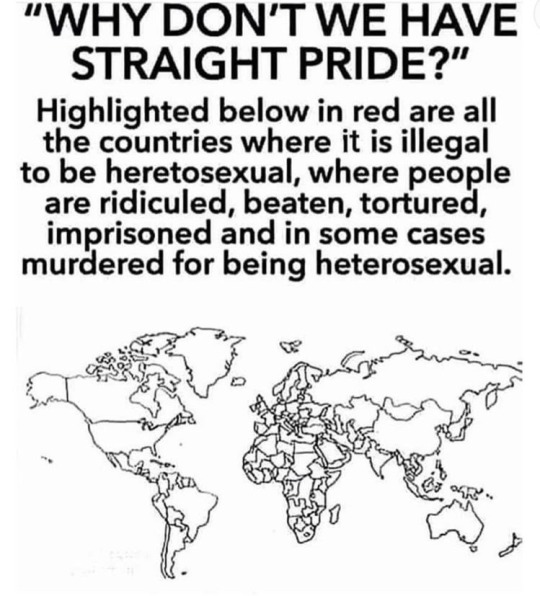#heterosexuality
Text
Today's aesthetic: people who exclusively ship het in fandoms with like one male character with a speaking role.
1K notes
·
View notes
Text
I suspect that men are attracted to the performance of femininity rather than the presentation itself. when my parents go to a party, my stepmom takes ages to put on her makeup and my dad just sits & watches. does he have any idea what kind of lipstick looks best? what eyebrow shape is in style? absolutely not. but he likes to see her prettying herself up while his ugly ass does nothing. she's signifying her place as an object to be looked at. women have to be dolls and their men get to be human
1K notes
·
View notes
Text
The more women are paid, the less eager they are to marry. A 1982 study of three thousand singles found that women earning high incomes are almost twice as likely to want to remain unwed as women earning low incomes. "What is going to happen to marriage and childbearing in a society where women really have equality?" Princeton demographer Charles Westoff wondered in the Wall Street Journal in 1986. "The more economically independent women are, the less attractive marriage becomes."
Men in the '80s, on the other hand, were a little more anxious to marry than the press accounts let on. Single men far outnumbered women in dating services, matchmaking clubs, and the personals columns, all of which enjoyed explosive growth in the decade. In the mid-80s, video dating services were complaining of a three-to-one male-to-female sex ratio in their membership rolls. In fact, it had become common practice for dating services to admit single women at heavily reduced rates, even free memberships, in hopes of remedying the imbalance.
Personal ads were similarly lopsided. In an analysis of 1,200 ads in 1988, sociologist Theresa Montini found that most were placed by thirty-five-year-old heterosexual men and the vast majority "wanted a long-term relationship." Dating service directors reported that the majority of men they counseled were seeking spouses, not dates. When Great Expectations, the nation's largest dating service, surveyed its members in 1988, it found that 93 percent of the men wanted, within one year, to have either "a commitment with one person" or marriage. Only 7 percent of the men said they were seeking "lots of dates with different people." Asked to describe "what concerns you the day after you had sex with a new partner," only 9 percent of the men checked "Was I good?" while 42 percent said they were wondering whether it could lead to a "committed relationship."
These men had good cause to pursue nuptials; if there's one pattern that psychological studies have established, it's that the institution of marriage has an overwhelmingly salutary effect on men's mental health. "Being married," the prominent government demographer Paul Glick once estimated, "is about twice as advantageous to men as to women in terms of continued survival." Or, as family sociologist Jessie Bernard wrote in 1972:
“There are few findings more consistent, less equivocal, [and] more convincing, than the sometimes spectacular and always impressive superiority on almost every index—demographic, psychological, or social—of married over never-married men. Despite all the jokes about marriage in which men indulge, all the complaints they lodge against it, it is one of the greatest boons of their sex.”
Bernard's observation still applies. As Ronald C. Kessler, who tracks changes in men's mental health at the University of Michigan's Institute for Social Research, says: "All this business about how hard it is to be a single woman doesn't make much sense when you look at what's really going on. It's single men who have the worst of it. When men marry, their mental health massively increases."
The mental health data, chronicled in dozens of studies that have looked at marital differences in the last forty years, are consistent and overwhelming: The suicide rate of single men is twice as high as that of married men. Single men suffer from nearly twice as many severe neurotic symptoms and are far more susceptible to nervous breakdowns, depression, even nightmares. And despite the all-American image of the carefree single cowboy, in reality bachelors are far more likely to be morose, passive, and phobic than married men.
When contrasted with single women, unwed men fared no better in mental health studies. Single men suffer from twice as many mental health impairments as single women; they are more depressed, more passive, more likely to experience nervous breakdowns and all the designated symptoms of psychological distress—from fainting to insomnia. In one study, one third of the single men scored high for severe neurotic symptoms; only 4 percent of the single women did.
-Susan Faludi, Backlash: the Undeclared War Against American Women
430 notes
·
View notes
Text

146 notes
·
View notes
Text
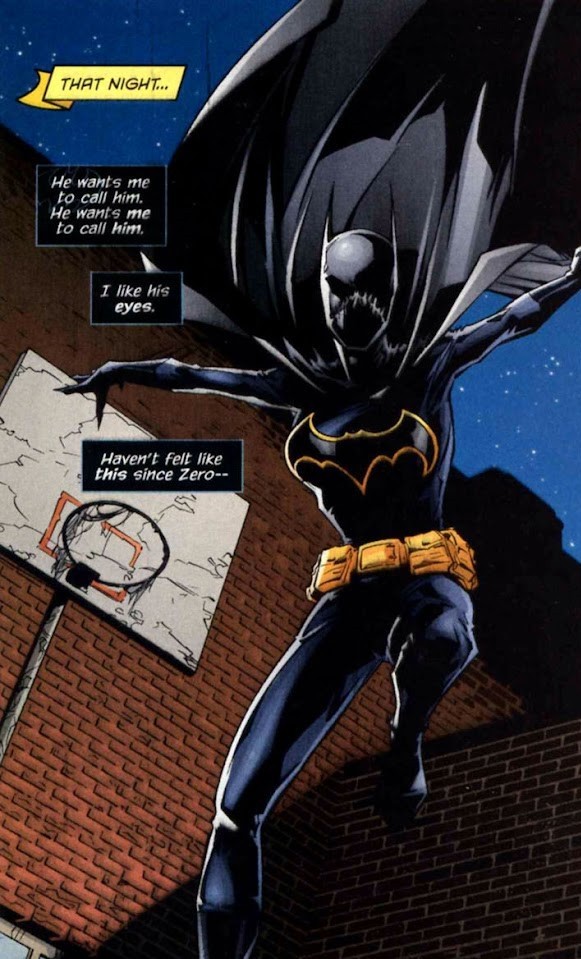
But what's the point of this? Another love at first sight for a fucking random piece of shit? Really, I just don't mean to be misandric, but it really pisses me off to see this shit being pulled out more forced than anything. Cassandra may be bi, which isn't for me in my own headcanon, okay. But why do they have to pull characters out of nowhere for straight romances?
Couldn't they at least build something decent and fleshed out? No. Let's just have her, out of nowhere, be attracted to a guy she just saw. Her, a queercoded character with different problems for her social development who should be indifferent to all these things.
I mean, the main reason I support Stephcass's ship is because of everything that has been behind it. The relationship they've had, their bond. The way Cassandra cherished her so much and, after Steph's supposed death, every time Cass "died", she couldn't stop thinking about joining her in heaven. Because she wanted to be with her. Because she was his best and only friend. The one he loved and cherished the most. I am absolutely certain that, if Steph were a man, he would have been a romantic interest for Cassandra from the beginning.
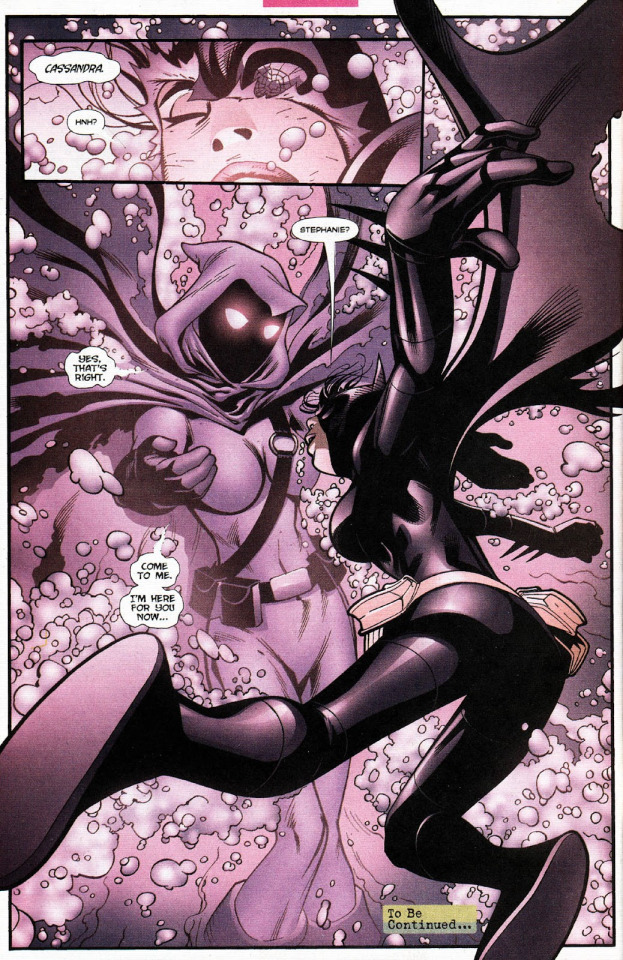
Anyway I have to say that I am able to recognize the fact that all this interpretation I do, just, around the way I personally perceive Cassandra Cain, (un)consciously inserting my headcanons where I see her as asexual and sapphic as she develops a more personal and intimate bond with Stephanie Brown.

But of course, that's my headcanon. Not the reality of the comics. And saying all this sounds stupid, I know. But it bothers me. It bothers me to be reading a story and all of a sudden, wham! New completely unnecessary heterosexual romantic interest. Which if that were sapphic I'd also complain in case it came out of nowhere, because I don't see Cassandra falling in love or feeling things, just like that, in such a sudden way.
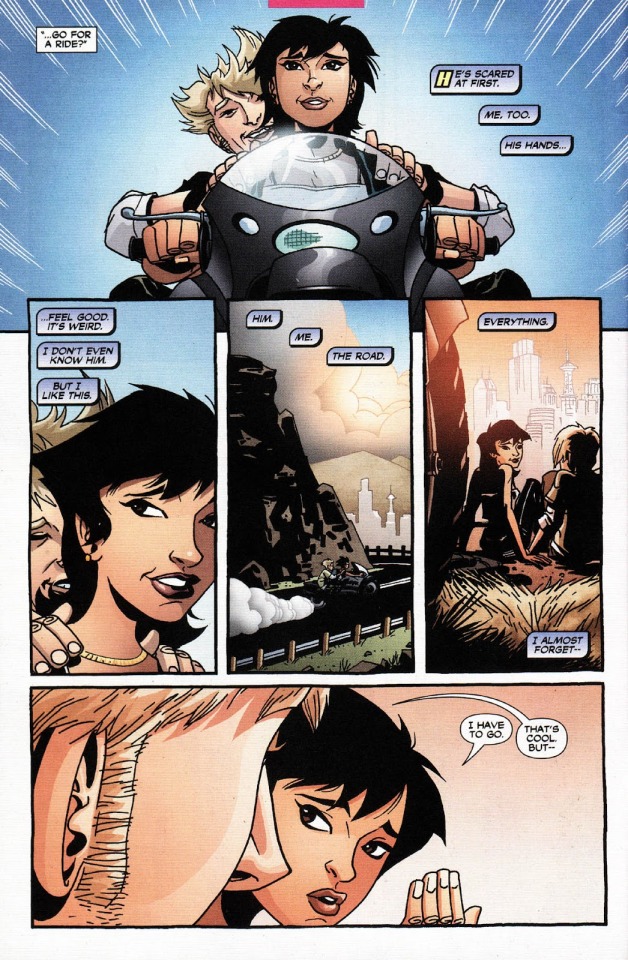
I don't want to go that long with this either. Only to indicate that I consider out of place a punctuation like that, above all reminding us of the sporadic romance that Cassandra had… WITH HER STALKER. WITH SOMEONE WHO STALKED HER. And that came to nothing, just her giving him a ride on a motorcycle to kiss him--- - And yet it contributed absolutely nothing. Nothing.
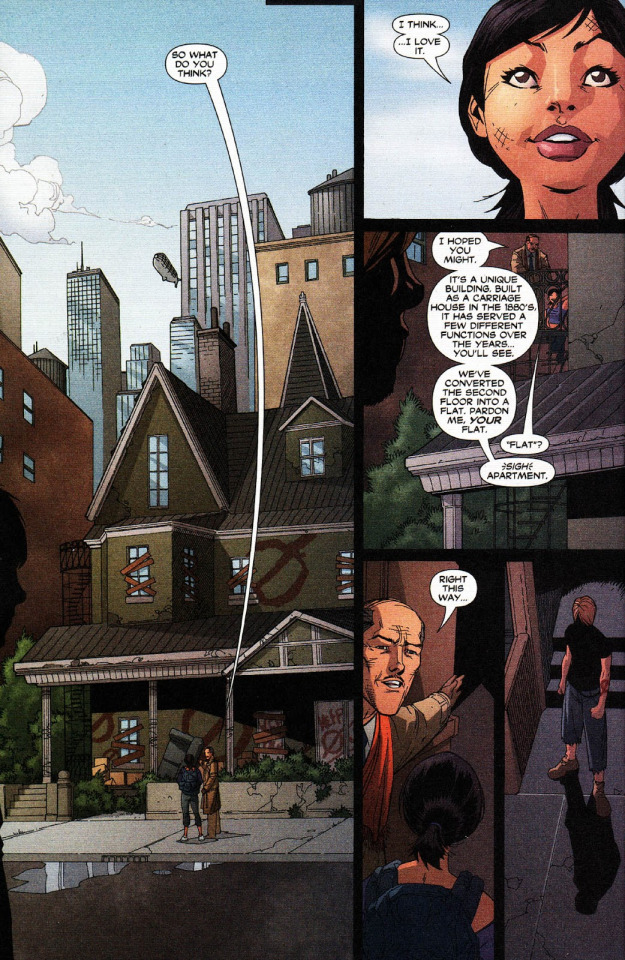

(Likewise I know that half of straight relationships in many media don't serve to contribute anything. And I'm not saying that a relationship should contribute or bestow something, a benefit. But it has to have a purpose, a character arc, the development of a bond, personal. The way in which, for example, Cassandra learns to trust and, above all, love someone she should cherish…. COF COF, STEPHANIE BROWN)


#cassandra cain#cass cain#stephanie brown#batgirls#stephcass#heterosexuality#sexuality#heteronormativity#sapphic#queer#lesbian#redemption road#batgirl
67 notes
·
View notes
Text
Love's Cosmic Secret: The Myth of Our Missing Halves
Why Some Folks in Love Feel Complete, While Those on the Hunt Feel Like Something's Missing?
Long ago, humans weren't quite the way we are today. Picture this: we used to be round, with two bodies facing outwards, each sporting a single head and two faces looking in opposite directions. We had four legs, four arms, and four hands, and there were not just two, but three sexes back then. The first type had two male bodies, and they were believed to be the offspring of the sun. The second had two female bodies, and they were the children of the earth. And the third had one of each, and they were born under the moon's watchful gaze.
These peculiar beings could walk forwards, backwards, and even roll around at lightning speed. But one fateful day, they got a bit too ambitious and tried to challenge the gods by scaling Mount Olympus. Needless to say, Zeus was far from thrilled. As punishment, he took a big cleaver and sliced each one in half.
Since that eventful day, us humans have been yearning for our missing halves – the parts that make us feel whole. The male bits that got separated from other males became male homosexuals, the female parts that were split from their female counterparts turned into lesbians, and those who originally had one of each ended up as heterosexual.
When these divided souls come to realize they're missing their other half, they're overjoyed to find them again. It's like a cosmic puzzle coming together, and they feel complete once more.
Have you ever felt this yearning?
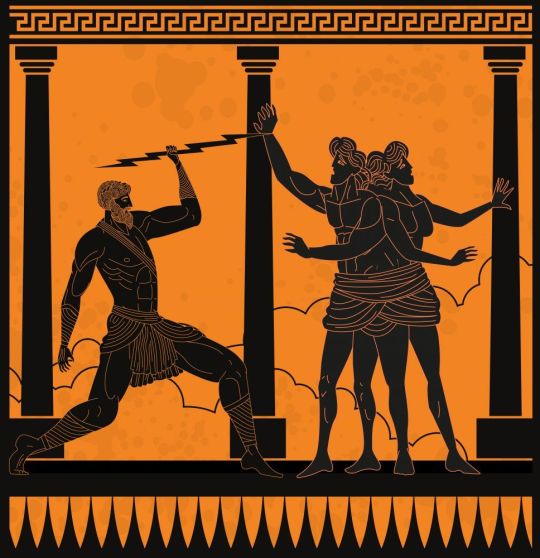
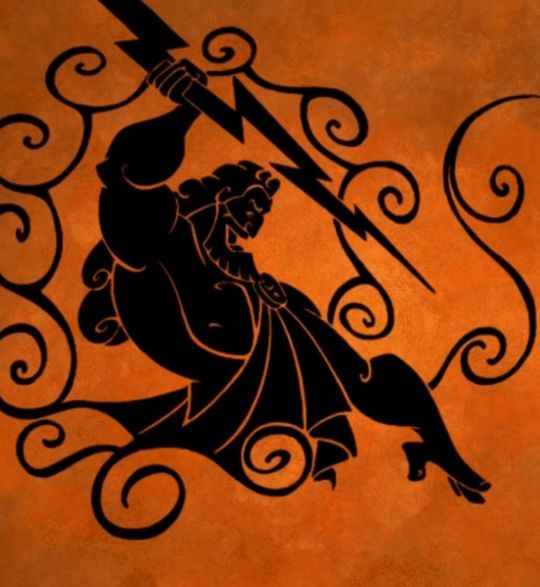
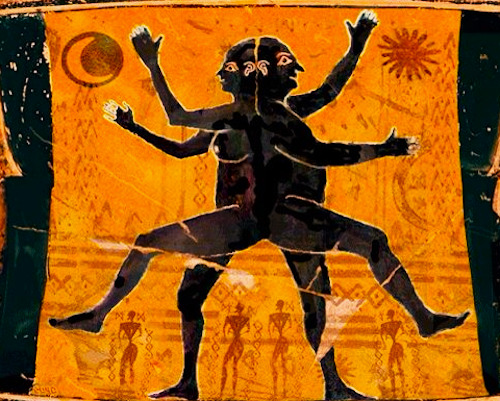
#lgbtqia+#greek mythology#mythology and folklore#gods#zeus#soulmates#lore olympus#live from platos cave#Aristophanes#mythical creatures#greek#Plato#soul#homosexuality#heterosexuality
37 notes
·
View notes
Text

Sandilands and Erickson observe that “at least since the early twentieth century, wild spaces have been understood and organized in a way that presents nature […] as a site for the enactment of a specific heteromasculinity”(3) and that even the beginnings of wilderness preservation and conservation movements in North America were not without this connection. This time period (late nineteenth century), was one of vast changes that meant a lot of anxiety for elite white men and their power such as “immigration, urban expansion, industrialization, women’s increasing economic independence, and the transformation of the economy from entrepreneurial to corporate capitalism, to name a few factors” (3) (Theodore Roosevelt became the poster child for heteromasculinity, as he ‘reinvented’ himself in the wilderness, close by to the same area where Brokeback Mountain was filmed (40)). The wilderness then became a new stomping ground for these elite white men to enact their superiority and assert their ‘increasingly heterosexual identities’ (4).
#queer ecology#heteronormativity#ecology#brokeback mountain#usa#heterosexuality#heteromasculinity#queer ecologies: sex nature politics desire
10 notes
·
View notes
Text
'Why did he kill you?'
'Because we discovered his secret. Do you know what a man's secret is? It's that he wants us dead, but he also wants our love.'
Anna Biller, from Bluebeard's Castle
#femicide#murder#murder victims#dialogue#misogyny#patriarchy#heterosexuality#bluebeard#quotes#lit#words#excerpts#quote#literature#anna biller#bluebeard's castle
10 notes
·
View notes
Text
It’s like 4am I can’t sleep and I’m just randomly thinking about how my whole childhood heterosexuality was forced down my throat and the throats of children, like one thing that when your friends asked you who your crush was and they wouldn’t take I don’t have one for an answer and children can be manipulative shits and make you feel like shit for not telling them your crush even if you don’t have one but you couldn’t say someone of your own gender because that was gross and you would just pick up on that without having to be told so you would pick a random person in your mind to have a “crush” on at the start of the year and when your pressured into saying your “crush” you waited for your friends to tell you theirs so you don’t accidentally say their crush because then they would be mad at you and cause drama
#for any errors it’s 4 am and I’m tired#gremlin rambles#queer rambles#bi#bisexual#nonbinary#crushes#gay#lesbian#queer#wlw#pan#pansexual#lgbt#lgbtqia#aromantic#aro#aroace#compulsory heterosexuality#heterosexuality
101 notes
·
View notes
Text

5 notes
·
View notes
Text
The concept of heterosexuality was invented in 1892.
I’m not kidding. It’s inaccurate to call anyone “straight” or “heterosexual” from before that year.


(Jonathan Ned Katz, “The Invention of Heterosexuality,” 1990)
19 notes
·
View notes
Text
“It is a truism in the literature on working wives that although the husbands of working wives do help with household tasks, all too often wives continue to have responsibility for running the household. They rush home from work, shopping on the way, in order to have dinner on the table by six. They clean and tend to the laundry and do whatever has to be done in the evenings or on weekends. This is not role sharing.
The husband may promise to do his share, and increasingly he does or, at least, agrees to. But he can make his contribution so grudgingly as to force the wife to conclude that she would rather do it herself. Pat Mainardi has shown how such reluctant sharers of the burden manage to renege. She has translated all of their dodges. Eleven are standard:
“I don't mind sharing the housework, but I don't do it very well. We should each do the things we're best at." MEANING: Unfortunately I’m no good at things like washing dishes or cooking. What I do best is a little light carpentry, changing light bulbs, moving furniture (how often do you move furniture?). ALSO MEANING: Historically the lower classes (black men and us) have had hundreds of years experience doing menial jobs. It would be a waste of manpower to train someone else to do them now. ALSO MEANING: I don't like the dull stupid boring jobs, so you should do them.
"I don't mind sharing the work, but you'll have to show me how to do it." MEANING: I ask a lot of questions and you'll have to show me everything every time I do it because I don't remember so good. Also don't try to sit down and read while I'm doing my jobs because I'm going to annoy hell out of you until it's easier to do them yourself.
"We used to be so happy!" (Said whenever it was his turn to do something.) MEANING: I used to be so happy. MEANING: Life without housework is bliss. No quarrel here. Perfect agreement.
“We have different standards, and why should I have to work to your standards? That's unfair." MEANING: If I begin to get bugged by the dirt and crap I will say, "This place sure is a sty" or "How can anyone live like this?" and wait for your reaction. I know that all women have a sore called "Guilt over a messy house" or "Household work is ultimately my responsibility." I know that men have caused that sore—if anyone visits and the place is a sty, they're not going to leave and say, "He sure is a lousy housekeeper." You'll take the rap in any case. I can outwait you. ALSO MEANING: I can provoke innumerable scenes over the housework issue. Eventually doing all the housework yourself will be less painful to you than trying to get me to do half. Or I'll suggest we get a maid. She will do my share of the work. You will do yours. It's woman's work.
"I've got nothing against sharing the housework, but you can't make me do it on your schedule." MEANING: Passive resistance. I'll do it when I damned well please, if at all. If my job is doing dishes, it's easier to do them once a week. If taking out laundry, once a month. If washing the floors, once a year. If you don't like it, do it yourself oftener, and then I won't do it at all.
"I hate it more than you. You don't mind it so much." MEANING: Housework is garbage work. It's the worst crap I've ever done. It's degrading and humiliating for someone of my intelligence to do it. But for someone of your intelligence. . . .
"Housework is too trivial to even talk about." MEANING: It's even more trivial to do. Housework is beneath my status. My purpose in life is to deal with matters of significance. Yours is to deal with matters of insignificance. You should do the housework.
"This problem of housework is not a man-woman problem. In any relationship between two people one is going to have a stronger personality and dominate. MEANING: That stronger personality had better be me.
"In animal societies, wolves, for example, the top animal is usually a male even where he is not chosen for brute strength but on the basis of cunning and intelligence. Isn't that interesting?" MEANING: I have historical, psychological, anthropological, and biological justification for keeping you down. How can you ask the top wolf to be equal?
"Women's Liberation isn't really a political movement." MEANING: The Revolution is coming too close to home. ALSO MEANING: I am only interested in how I am oppressed, not how I oppress others. Therefore the war, the draft, and the university are political. Women's Liberation is not.
"Man's accomplishments have always depended on getting help from other people, mostly women. What great man would have accomplished what he did if he had to do his own housework?" MEANING: Oppression is built into the system and I, as the white American male, receive the benefits of this system. I don't want to give them up.”
Jessie Bernard, The Future of Marriage
#jessie bernard#heterosexuality#housework#weaponized incompetence#male privilege#female oppression#male entitlement#mental load
56 notes
·
View notes
Text
shoutout to all my straight radfems 🙌🏿
Here's some topics to think about:
Amatonormativity:
the assumption that a central, exclusive, romantic relationship is normal for humans, and is a universally shared goal.
Feeling incomplete or worthless without men? Does the idea of never dating a man embarrass or scare you? make you feel forever alone? Maybe something to look into. We can be satisfied with other types of love, romantic love is not inherently more valuable.
Non Penetrative Sex:
A safer option against STDs or STIs, reduces pregnancy risk, a focus on finding your own pleasure instead of the whole "getting off on your man getting off" cope, actually find what works for you.
NOT Living with your SO:
No need to worry about the oh-so common unequal division of household labor. Co-habitation with romantic partners can be isolating. Seperate living spaces can encourage you to meet other people and have a life outside of your partner. Several couples stay in relationship only because of all the mutual friends and acquaintances they share. Live with other women instead maybe.
Open Relationships:
Keeping things light and non-committal, as a lot of relationships get unnecessary bogged down by societal expectations (which tend to be gendered and sexist). Combats the narrative that it's a woman's job as a partner to "get over" not being in the mood for sex. Only have sex if you both want to, with each other.
Living for Yourself
Less and Less women are getting married. There is so many possibilities for us now. Travel, pick up hobbies, learn languages, help others, etc. Tying yourself to men is not the only choice. Think about choosing yourself.
#radical feminism#radfem#feminism#separatism#heterosexuality#did not proofread and im not sober sorry
228 notes
·
View notes
Photo
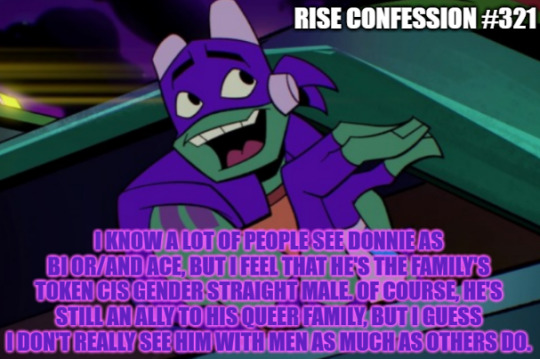
“I know a lot of people see Donnie as Bi or/and ace, but I feel that he's the family's token Cis Gender Straight male. Of course, he's still an ally to his queer family, but I guess I don't really see him with men as much as others do.”
#rise donnie#rise don#rise donatello#straight#heterosexuality#straight ally#tmnt headcanons#rottmnt headcanons#rottmnt#rottmnt season 3#rise of the turtles#rise of tmnt#rise of the tmnt#Rise of the teenage mutant ninja turtles#unpause rottmnt#unpause rise of the tmnt#Unpause Rise of the Teenage Mutant Ninja Turtles#bring back Rise#bring back rottmnt#bring back rise of the tmnt#tmnt#rise confessions#rise confession 321
20 notes
·
View notes
Text
“The preoccupation with involving, engaging and ‘educating’ men precludes a critical examination of heterosexuality: how can this oppressive institution be examined and rejected if women’s boyfriends and husbands are present?
The lack of consciousness-raising means that many UK feminist groups currently tend to construct patriarchal oppression as somehow ‘over there’ – in Parliament, in pornography, in ‘lads’ mags’, in The Sun newspaper – rather than ‘right here’, in one’s personal life and relationships. In this construction, the words ‘patriarchy’ and ‘misogyny’ themselves come to stand in as convenient abstractions that facilitate the avoidance of naming men directly as oppressors. This tendency in turn means that mainstream UK feminism is currently limited to a predominantly liberal, reformist agenda, which often means single-issue campaigning.
Feminist organising is reduced to a reformist tactical repertoire of petitions, placards, Twitter hashtags, marches and demonstrations, rather than revolutionary acts of refusing to accommodate men, rejecting femininity, forging primary bonds and relationships with women, setting up all-female collectives, and creating lesbian feminist communities and culture. The construction of patriarchal oppression as ‘over there’ means that heterosexuality stands out as one of the last bastions of patriarchy where the notion of individual choice remains thoroughly unexamined.
This leads to curious scenarios such as the phenomenon of feminists who might be critical of the notion of ‘choice’ and ‘agency’ in relation to oppressive systems such as pornography and prostitution, posting pictures of themselves in wedding dresses on social media, and defending their ‘choices’ in relation to marriage – even to the extent of taking their husband’s surname – as a purely private affair.
The consequences of a lack of critique of heterosexuality and the erasure of lesbian feminism from feminist politics are extremely serious in terms of the future of a feminist movement and ultimately, the future of women generally. As long as mainstream feminism is preoccupied with including men, it is obstructing the very thing that most needs to happen: the building of a mobilised, enraged and woman-loving women’s liberation movement. It seems extraordinary that at the moment, a woman seeking support after experiencing violence from her male partner is unlikely to encounter a lesbian feminist support worker in a women’s refuge or rape crisis centre. It seems equally extraordinary that among all the support that she will be offered, the insight that heterosexuality is not inevitable is unlikely to be forthcoming. It is even more extraordinary that such observations are seldom made at all within the women’s sector, and within feminist activist circles.
Nonetheless, in the face of the lack of feminist politics around heterosexuality, there have been some crucial departures in recent years. The first has been the flourishing of a number of radical feminist blogs critiquing heterosexuality and showing a renewed interest in lesbian feminism. These blogs, and the presence of radical lesbian feminist individuals and groups on social media, are currently producing pioneering lesbian feminist work in the face of relative silence from academic and mainstream activist feminists. Other important UK-specific developments include a number of women-only, radical feminist conferences, two of which – RadFem 2012 and RadFem 2013 – foregrounded lesbian feminism, generating huge interest among younger women who previously had little chance to discuss these topics within other groups. Finally, in the wake of these conferences, the task of rebuilding lesbian feminist politics and community has begun, in the form of online networks, artistic output and small local, intergenerational groups. It is the commitment and vision of those involved in these projects that is helping to create a space where the tyranny of compulsory heterosexuality can at last dare to speak its name.”
- The Oppression That Dare Not Speak Its Name? Silences Around Heterosexuality In Contemporary Feminism by Julia Long
137 notes
·
View notes
